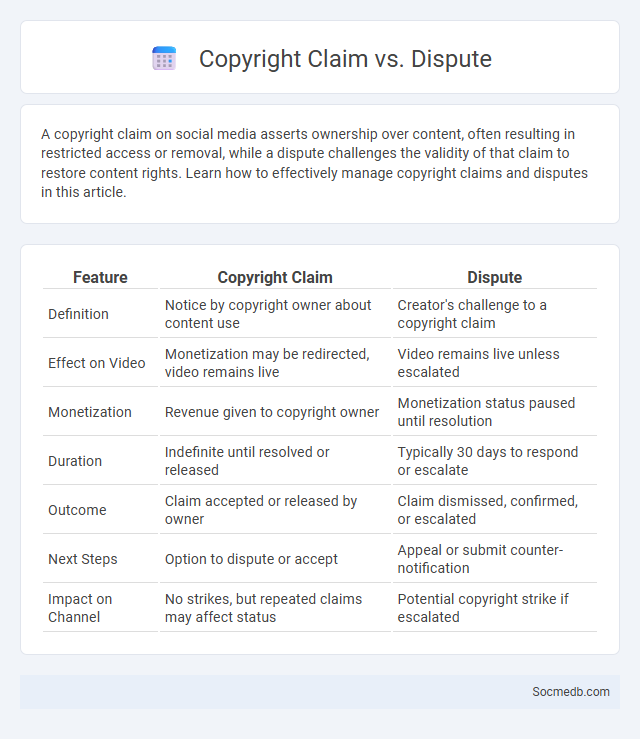
Photo illustration: Copyright Claim vs Dispute
A copyright claim on social media asserts ownership over content, often resulting in restricted access or removal, while a dispute challenges the validity of that claim to restore content rights. Learn how to effectively manage copyright claims and disputes in this article.
Table of Comparison
| Feature | Copyright Claim | Dispute |
|---|---|---|
| Definition | Notice by copyright owner about content use | Creator's challenge to a copyright claim |
| Effect on Video | Monetization may be redirected, video remains live | Video remains live unless escalated |
| Monetization | Revenue given to copyright owner | Monetization status paused until resolution |
| Duration | Indefinite until resolved or released | Typically 30 days to respond or escalate |
| Outcome | Claim accepted or released by owner | Claim dismissed, confirmed, or escalated |
| Next Steps | Option to dispute or accept | Appeal or submit counter-notification |
| Impact on Channel | No strikes, but repeated claims may affect status | Potential copyright strike if escalated |
Understanding Copyright Claims
Understanding copyright claims on social media is essential for protecting your content and avoiding legal disputes. Copyright claims occur when original works such as images, videos, or music are used without permission, triggering takedown requests or revenue sharing. You should familiarize yourself with platform-specific policies and use tools to verify ownership, ensuring your content remains safe and compliant.
What is a Copyright Dispute?
A copyright dispute on social media arises when users or content creators claim unauthorized use or replication of their original works, such as images, videos, or text. These conflicts often involve allegations of copyright infringement, leading to content removal requests or legal actions based on intellectual property rights. Platforms like Facebook, Instagram, and YouTube have specific mechanisms to handle copyright complaints, ensuring protection of creators while balancing fair use policies.
Defining a Copyright Strike
A copyright strike on social media occurs when a platform receives a valid complaint asserting unauthorized use of copyrighted content, resulting in restrictions or removal of the infringing material. This strike typically impacts account privileges, including video removal, temporary suspension, or limited monetization opportunities. Platforms like YouTube and Facebook enforce copyright strikes to protect intellectual property rights and maintain compliant user-generated content.
Key Differences: Claim vs Dispute vs Strike
A claim on social media involves someone asserting ownership over content, typically for copyright reasons, whereas a dispute is your formal challenge to that claim, asserting your right to use the content. A strike is a more severe penalty, often following unresolved disputes, which can lead to restrictions or account sanctions. Understanding these distinctions helps you effectively manage content rights and avoid negative impacts on your social media presence.
How Copyright Claims Impact Content Creators
Copyright claims significantly affect content creators by restricting their ability to monetize and share original works freely. These claims can lead to demonetization, video removal, or account suspension on platforms like YouTube and Instagram, hindering creators' revenue streams and audience growth. Navigating copyright laws and platform policies requires creators to invest time in legal understanding or licensing, which can limit content production and innovation.
The Dispute Process Explained
The dispute process on social media involves reporting content that violates platform policies, where your claim undergoes an initial review by automated systems and human moderators. If the content is removed or restricted, you may have the option to appeal the decision, prompting a more thorough examination to ensure fairness. Understanding this process empowers you to protect your rights and maintain a positive online environment.
Consequences of Receiving a Copyright Strike
Receiving a copyright strike on social media can lead to account suspension or permanent removal, significantly impacting content creators' ability to share and monetize their work. Platforms like YouTube implement strict policies where three copyright strikes may result in account termination, restricting access to previously uploaded content. Content creators face lost revenue, diminished audience reach, and potential legal repercussions if copyright disputes remain unresolved.
Steps to Resolve Copyright Issues
Identify the copyrighted content causing the issue by reviewing your social media posts or interactions carefully. Submit a formal copyright complaint via the platform's designated reporting system, providing proof of ownership or authorized use when required. Protect your digital presence by promptly addressing takedown notices and considering legal advice to resolve disputes efficiently, ensuring your content remains compliant with copyright laws.
Tips for Avoiding Copyright Violations
To avoid copyright violations on social media, always use content that you have created or obtained proper licenses for, including images, music, and videos. Credit original creators explicitly when sharing their work and utilize platforms' built-in copyright tools to ensure compliance with guidelines. Regularly review social media policies and copyright laws like the DMCA to stay updated on responsible content sharing practices.
Frequently Asked Questions about Copyright Enforcement
Frequent questions about copyright enforcement on social media often center on how platforms detect and handle infringing content. You need to understand that most platforms use automated systems like Content ID and rely on user reports to identify violations quickly. Copyright holders can submit takedown notices, but fair use exceptions and proper licensing are crucial to avoid content removal.
 socmedb.com
socmedb.com